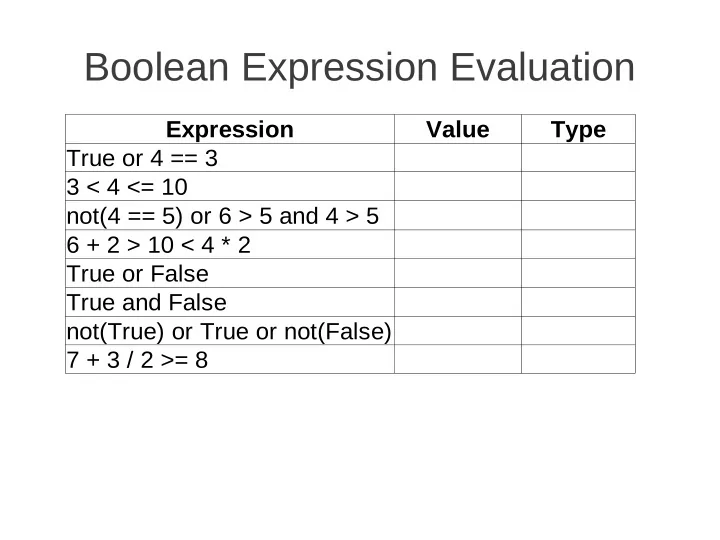

Boolean Expression Evaluation Expression Value Type True or 4 == 3 3 < 4 <= 10 not(4 == 5) or 6 > 5 and 4 > 5 6 + 2 > 10 < 4 * 2 True or False True and False not(True) or True or not(False) 7 + 3 / 2 >= 8
Code Tracing What is printed when the following code is executed? l = ["open", "close", "in", "out", "up", "down" ] for i in range(0,6,2): print l[i]
List Practice What will be the output of the following sequence of code? mylist = ["Hello", 88.5, 100, "cs190"] print len(mylist) print mylist[0] print mylist[len(mylist)] print mylist[2:] print mylist[0:2] mylist.append(140) print mylist mylist[0] = 4 mylist[3] = 200 print mylist mylist.sort() print mylist mylist.reverse() print mylist
Output of Program def fun1(x): print "Fun1 x:", x return x * 2 print "Start" y = fun1(10) if (5 > y ): print y elif ( 15 > y ): print y + 10 elif (25 > y ): print y + 100 elif (35 > y): print y + 1000 else: print y + 10000 print "End"
Function Writing Write a function called two which takes a list of numbers as an input parameter. This function should return True if 2 appears as either the first or last element in the array. The list will be length 1 or more. Examples of function calls: two([1, 2, 2]) → True two([2, 1, 2, 3]) → True two([13, 6, 1, 2, 3]) → False
Function Writing(2) Write a function called stringTimes that takes two input parameters: ● A string ● A non-negative integer representing the number of times a string should be copies. The function should return a larger string that is n copies of the original string. You may not use the * operator to accomplish this repetition. Examples: stringTimes('Hi', 2) → 'HiHi' stringTimes('Hi', 3) → 'HiHiHi' stringTimes('Hi', 1) → 'Hi'
Function Writing(3) Write a function called sumEvens that takes a non-negative integer as an input parameter. The function should return the sum of the even numbers between 0 and the input parameter. If the input parameter is even, it should be included in the sum. Examples: sumEvens(2) → 2 sumEvens(3) → 2 sumEvens(6) → 12
Recommend
More recommend